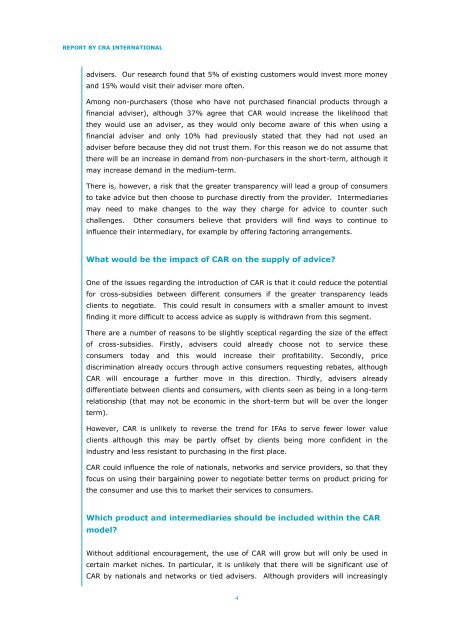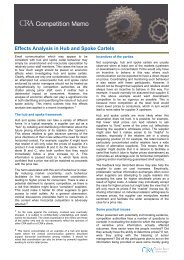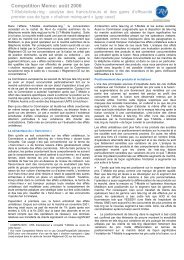CUSTOMER AGREED REMUNERATION - CRA International
CUSTOMER AGREED REMUNERATION - CRA International
CUSTOMER AGREED REMUNERATION - CRA International
You also want an ePaper? Increase the reach of your titles
YUMPU automatically turns print PDFs into web optimized ePapers that Google loves.
REPORT BY <strong>CRA</strong> INTERNATIONAL<br />
advisers. Our research found that 5% of existing customers would invest more money<br />
and 15% would visit their adviser more often.<br />
Among non-purchasers (those who have not purchased financial products through a<br />
financial adviser), although 37% agree that CAR would increase the likelihood that<br />
they would use an adviser, as they would only become aware of this when using a<br />
financial adviser and only 10% had previously stated that they had not used an<br />
adviser before because they did not trust them. For this reason we do not assume that<br />
there will be an increase in demand from non-purchasers in the short-term, although it<br />
may increase demand in the medium-term.<br />
There is, however, a risk that the greater transparency will lead a group of consumers<br />
to take advice but then choose to purchase directly from the provider. Intermediaries<br />
may need to make changes to the way they charge for advice to counter such<br />
challenges. Other consumers believe that providers will find ways to continue to<br />
influence their intermediary, for example by offering factoring arrangements.<br />
What would be the impact of CAR on the supply of advice?<br />
One of the issues regarding the introduction of CAR is that it could reduce the potential<br />
for cross-subsidies between different consumers if the greater transparency leads<br />
clients to negotiate. This could result in consumers with a smaller amount to invest<br />
finding it more difficult to access advice as supply is withdrawn from this segment.<br />
There are a number of reasons to be slightly sceptical regarding the size of the effect<br />
of cross-subsidies. Firstly, advisers could already choose not to service these<br />
consumers today and this would increase their profitability. Secondly, price<br />
discrimination already occurs through active consumers requesting rebates, although<br />
CAR will encourage a further move in this direction. Thirdly, advisers already<br />
differentiate between clients and consumers, with clients seen as being in a long-term<br />
relationship (that may not be economic in the short-term but will be over the longer<br />
term).<br />
However, CAR is unlikely to reverse the trend for IFAs to serve fewer lower value<br />
clients although this may be partly offset by clients being more confident in the<br />
industry and less resistant to purchasing in the first place.<br />
CAR could influence the role of nationals, networks and service providers, so that they<br />
focus on using their bargaining power to negotiate better terms on product pricing for<br />
the consumer and use this to market their services to consumers.<br />
Which product and intermediaries should be included within the CAR<br />
model?<br />
Without additional encouragement, the use of CAR will grow but will only be used in<br />
certain market niches. In particular, it is unlikely that there will be significant use of<br />
CAR by nationals and networks or tied advisers. Although providers will increasingly<br />
4




